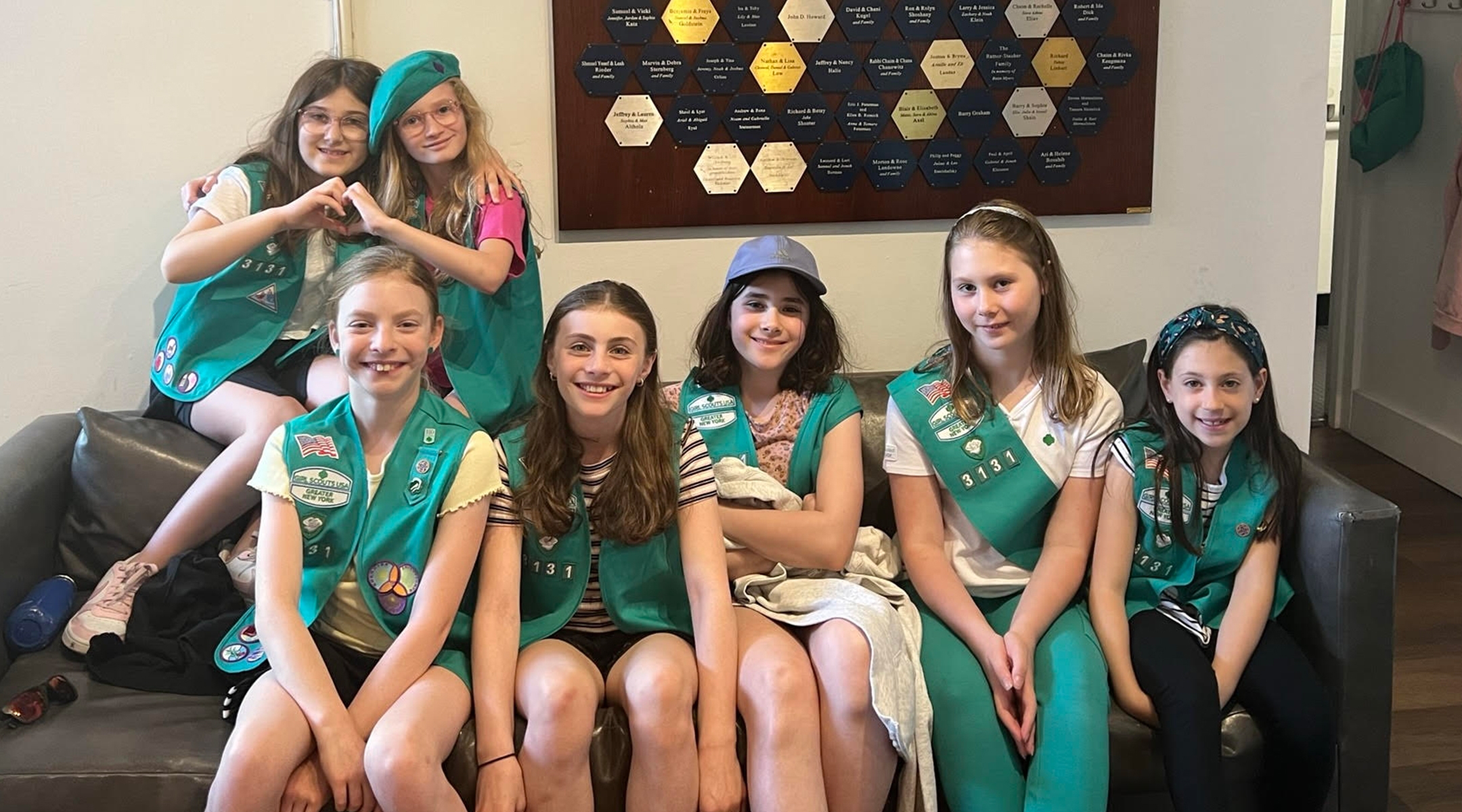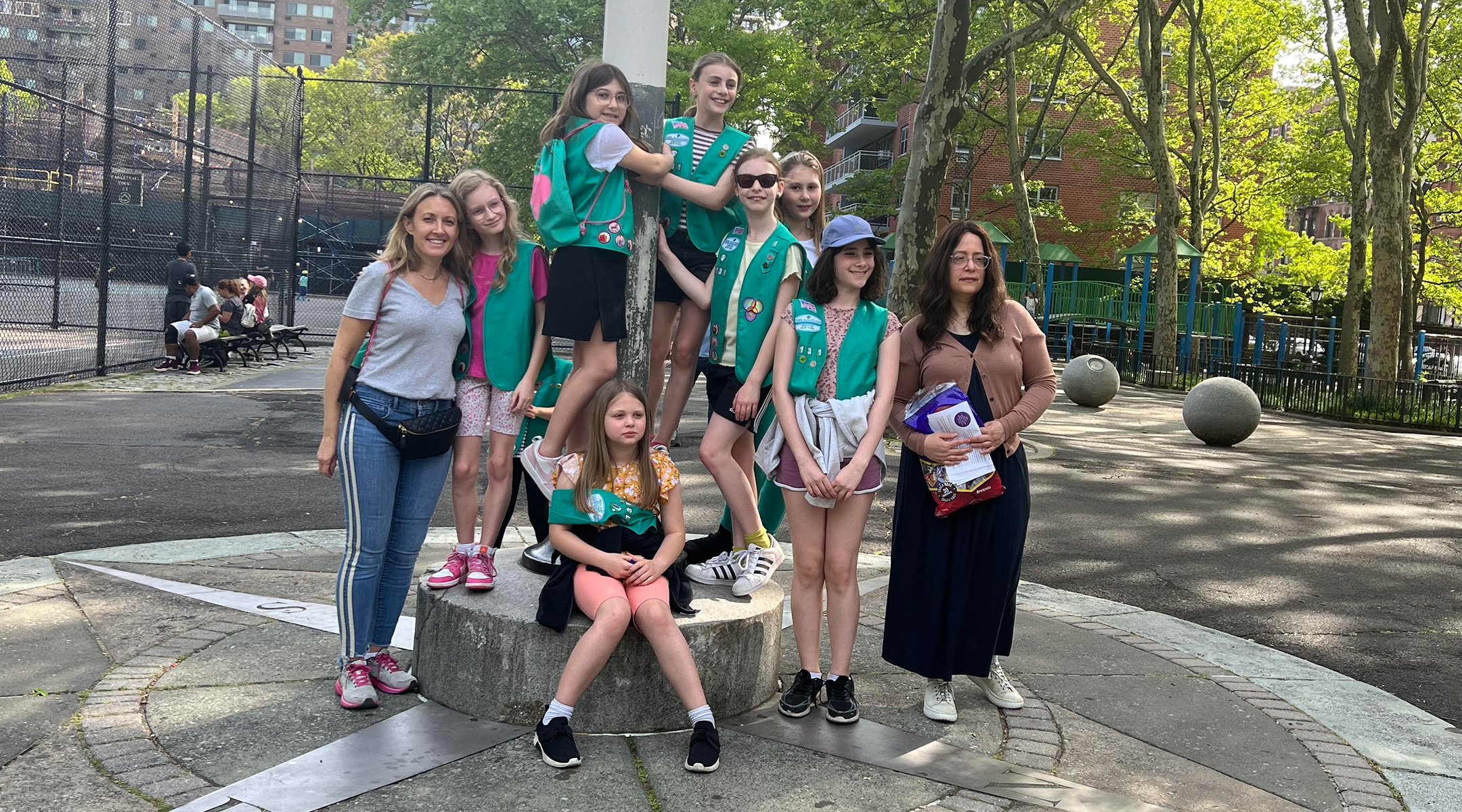(New York Jewish Week) — When people think of Girl Scouts, they tend to think of green uniforms, groups of girls working toward merit badges and, of course, tempting Girl Scout cookies with names like Samoas and Do-si-dos.
But Manhattan’s Girl Scout Troop 3131 does things a bit differently. Yes, its members wear uniforms, and participants participate in activities like making campfires and learning first aid.
But the girls of 3131 don’t sell those iconic cookies. That’s because, when the troop was founded, most Girl Scout cookies weren’t kosher to the troop’s standards — an important consideration because, when it was established in 2010, Troop 3131 made history as the first-ever Chabad-sponsored Girl Scout troop.
Based out of Chabad of the West Side and revived after a hiatus abetted by the COVID pandemic, the troop was originally designed for local Jewish girls from third through fifth grade who represent various levels of Jewish observance, from Reform to Modern Orthodox. Some attend Jewish day schools, while others go to secular public and private schools.
“Our troop is really across the board,” founder Sarah Alevsky, who is also co-director of family programs at the Chabad of the West Side, told the New York Jewish Week. “It really brings people in the Jewish community together, in a way — this is a space where they meet. This is a way for kids to get together Jewishly, and it’s really special.”
Jewish involvement in scouting dates back to the very beginning of Girl Scouts of the United States of America, in 1912, when founder Juliette Gordon Low asked four friends to become troop leaders with her. Three of them were Jewish: Leonora Amram, Mildred Guckenheimer and Henrietta Falk. The Savannah, Georgia-based troop also included several Jewish girls. Over the years, many prominent Jews have been Girl Scouts, including Barbara Walters, Gwyneth Paltrow and Gloria Steinem.
Over the course of the past 111 years, there have been many changes at the Girl Scouts. The organization has added extensive STEM, leadership and business education programming — which Troop 3131 has eagerly taken part in. More recently, the COVID-19 pandemic dictated that all troops meet virtually for some time.
Alevsky decided that she wouldn’t restart the troop after pandemic restrictions were lifted because the parents had previously not been involved as much as she would have liked. For Troop 3131 to work, she said, she needed some partners. “I wanted more buy-in if I was to restart it.”
Enter Upper West Sider Eve Helfstein, whose 10-year-old daughter, Bette, became fascinated with the idea of joining the Girl Scouts after watching the movie “Troop Beverly Hills.” With no troop available at Bette’s school, Helfstein decided to become certified as a troop leader.
When Helfstein learned that Chabad of the West Side had once housed a troop, she, with the help of two other local Jewish moms, hatched a plan to relaunch the group. “We strong-armed Sarah [Alevsky] into doing the troop again and she strong-armed us into helping out,” Helfstein said, explaining that Alevsky tapped her to recruit new members.
Within a matter of weeks they had 13 members, including three girls who are the third sisters in their family to join the troop.“The beautiful thing about this troop is that many of them would never have met otherwise — they wouldn’t have had the opportunity to,” Helfstein said.

Members of Girl Scouts Troop 3131 at Chabad of the West Side on May 7, 2023. (Elizabeth Karpen)
Troop 3131 doesn’t engage in explicitly Jewish activities. Instead, Judaism naturally weaves into their conversations and observations about the world around them. During a recent discussion about patterns in nature, in preparation for the “Shapes in Nature” badge, one of the girls pointed out how 12 triangles create the star of David, pointing to the symbol on a nearby bulletin board.
This easy integration of Jewish elements aligns with the core principles of Girl Scouting: allowing girls to explore their faith within the organization’s framework. “There’s so much overlap,” Alevsky said. “It’s so beautiful because the values are very universal, but also you can find your particular faith’s connection to it. Just like the Girl Scouts respect tradition, they leave it open so that whatever religion you are, you can figure out how to express it within the troop.”
“A lot of values that the Girl Scouts of America have are very similar to Judaism,” Helfstein said, pointing to the Girl Scout Law. A scout pledges to do her best “to be honest and fair, friendly and helpful, considerate and caring, courageous and strong, and responsible for what I say and do, and to respect myself and others, respect authority, use resources wisely, make the world a better place, and be a sister to every Girl Scout.”
Of course, the heart of the Girl Scouts experience is doing activities with friends. Recently, Troop 3131 completed the “Playing the Past” badge, which encouraged members to research the historical lives of girls. Some of the girls chose to research important Jewish women who came before them.
Lulu, 11, focused on the late Supreme Court Justice Ruth Bader Ginsburg, whom she described as “really strong and important.” To complete the activity, she had to bring a quote of Bader Ginsburg’s that inspired her, dress like the feminist icon and attend a tea party the troop held at the Chabad House.
“We went to a museum to find out about women who played roles in the past and we also got tea cups and saucers and we decorated it like the person who you were inspired by,” Lulu told the New York Jewish Week, adding that “Playing the Past” was her favorite activity of the year.
For Simone, 9, the highlight this year was a community meal the troop made for 70 people. The theme for the meal was breakfast-for-dinner, and the $10 all-you-can-eat feast included a menu of homemade bagels, waffles and eggs.
“We set up a restaurant,” she shared. “We made bagels and we cut up vegetables, and then we set it all up in one of the preschool classrooms, and then all of our families came. “We learned how to cook and the fun part was that we made everything ourselves.”
While the troop disagreed on the quality of their homemade bagels, they unanimously agreed that the experience of making them together was the highlight of the day.
Such skills, said Alevsky, help encourage independence, as well the girls’ sense of responsibility to one another. “The most important skill that I see from the girls is their cooperation, and that they’re working together and trying to figure out how to tackle a problem together and negotiate each one wanting to have their say, but at the same time, asserting themselves,” Alevsky said. “They’re figuring out what their voice is and what they want to say, and then also listening to their friends.”
“We always try to make the troop girl-led,” Helfstein added. “If they have an opinion about something, they voice it. If they have an idea about a badge, they voice it. It’s instilling that women can be leaders and their voices should and can be heard.”
To that end, while Troop 3131 doesn’t sell cookies as a group, they are encouraged to do so as individuals if it’s something that interests them.
(All Girl Scout cookies are certified kosher by the Orthodox Union and have been since 1995. But until 2016, all of the cookies contained dairy, and Chabad’s requirements for dairy products are different from the OU’s. Now, several of the cookies, including the iconic Thin Mints, are kosher and parve, making it possible for all kosher-keeping Jews to eat them.)
“We don’t make a big push for them to sell as a troop and for a number of reasons,” Alevsky explained. “Number one, when we first started our Girl Scout troop, not all of them were kosher, and then not all of them were up to the standard of Chabad. And then I realized that it’s just a lot more fun if we just leave the cookie-selling to people individually, if they want to do it, and then just focus on badges and trips and things like that.”
Next year, the troop plans to earn the “My Promise, My Faith” pin, in which scouts learn about important women in their religion and how they embody the Girl Scout Law.
“In today’s society, a lot of the Girl Scout virtues are getting lost,” Alevsky said. “Like when we talk about respect for yourself and others, the self gets more emphasis than the others. However, those ideas I think are really powerful and they really align with Jewish values.”
The New York Jewish Week brings you the stories behind the headlines, keeping you connected to Jewish life in New York. Help sustain the reporting you trust by donating today.





